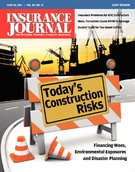It’s a sight to which native New Englanders are unaccustomed: toppled trees, boarded windows, ripped-off roofs and the general destruction left by the three tornadoes that earlier this month tore through Massachusetts.
Three people are dead, hundreds were injured and at least $90 million worth of homeowners claims have been tallied from the tornadoes, making this recent outbreak one of the bigger natural disasters in Bay State history, although by no means the biggest.
Perhaps in terms of psychological damage, though, this may be one of the bigger disasters in recent memory for the area. The state typically sees only two tornadoes a year, and has not seen a fatal one since 1995. But coming on the heels of major, deadly tornadoes elsewhere in the country – such as in Alabama and Missouri – it’s a grim reminder both of the pure power of nature and unpredictability of disasters of all kinds.
On an otherwise sunny Sunday morning, this struck me as I sat in the parking lot of a gas station in Southbridge, Mass., which only four days earlier had the unfortunate geographical luck to be in the way of a tornado. The gas station had survived with minimal damage, but across the street, chunks of siding, debris, and broken tree limbs – one of which had been thrown sideways and impaled in the wall of a building more than 100 feet away – told a different story.
As a native New Englander, having never witnessed the aftermath of a tornado up-close, the feeling was tremendously unsettling. For days I couldn’t shake the images from my mind – a natural feeling, I suppose, part of the brain’s processing information that just doesn’t jive with past experience. As improbable as tornadoes are, on any given day, natural disasters of all kinds really do lurk around any corner. But it’s often not until one occurs that this fact actually registers.
Street psychology aside, here’s the takeaway: One of the principal jobs of insurance agents is to cut through that mode thinking in their clients’ minds. Disasters – be they tornadoes, ice dams, fires, injuries or other risks – should never be far from agents’ minds, since they will most likely always be the last thing on a client’s. Agents don’t just sell insurance, they find ways to ease the aftermath of risks people don’t want to think about or haven’t.
Take it seriously: It’s important work, and there’s a lot to be done.
A recent study by the Associated Press, for instance, found that the Northeast has the second-highest percentage of homes (12.2 percent) without a typical property policy. By contrast, in the West, that number is about 3.3 percent. Recessiona aside, it appears as though some people aren’t getting the message.
Whether it’s a tornado down the street, or a flood on the other side of the country, think of it as a call to redouble your agency’s efforts at helping clients avoid pitfalls and confront the possibility of catastrophes of all sizes – especially ones they haven’t yet pondered.
Topics Catastrophe
Was this article valuable?
Here are more articles you may enjoy.


 Hackers Used AI to Breach 600 Firewalls in Weeks, Amazon Says
Hackers Used AI to Breach 600 Firewalls in Weeks, Amazon Says  Meta Loses Insurance for Defense in Major Social Media Addiction Litigation
Meta Loses Insurance for Defense in Major Social Media Addiction Litigation  What Berkshire’s CEO Abel Said About Insurance
What Berkshire’s CEO Abel Said About Insurance  Ford Recalling 4.3 Million US Vehicles Over Software Issue
Ford Recalling 4.3 Million US Vehicles Over Software Issue 


